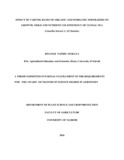Effect of Varying Rates of Organic and Inorganic Fertilizers on Growth, Yield and Nutrient Use Efficiency of Clonal Tea (Camellia Sinensis L. [o] Kuntze)
Abstract
Small scale tea farmers apply inorganic NPK fertilizers annually in a bid to increase tea yields
but the cost of fertilizers has been increasing leading to the reduction in the net returns. A study
was conducted to determine the effect of varying rates of organic and inorganic fertilizers on the
soil chemical properties, growth, yield and nutrient use efficiencies of clonal tea. Experiments
were set up at Kianjokoma in Embu County in 2014/2015 production year. The fertilizers used
were organic Rutuba® and inorganic NPK (26.5.5). The treatments comprised: no-fertilizer
control, 625 kg NPK/ha, 937.5 kg NPK/ha, 1875 kg NPK/ha, 625 kg Rutuba/ha + 625 kg NPK
/ha, 625 kg Rutuba/ha, 937.5 kg Rutuba/ha and 1875 kg Rutuba/ha. These treatments were laid
out in a randomized complete block design and replicated three times. Crop data collected
comprised green leaf yield, black made tea yield, leaf length and leaf width. Soils data collected
at the end of the experiment included pH, exchangeable acidity, organic carbon, micronutrients
and macronutrients. Nitrogen, phosphorus and potassium plant use efficiencies were also
determined. The cost and net revenue for each of the fertilizer treatments were also calculated.
Data were subjected to analysis of variance and mean separation was done using the least
significant difference test at p ≤0.05. The use of organic Rutuba increased the soil pH, Mn, Cu,
Fe, Zn, Ca and Mg levels. Application of 625 kg Rutuba/ha + 625 kg NPK/ha resulted to
increased leaf length, leaf width, fresh green leaf yield and made tea yield relative to the nofertilizer
control and the farmers’ practice. The results indicated that the agronomic efficiency,
apparent nutrient recovery and partial factor productivity of N, P and K were significantly
enhanced by the application of Rutuba fertilizer relative to inorganic NPK fertilizer. The study
further demonstrated that use of NPK 26.5.5 rates of more than 625 kg/ha did not increase
growth, yield, nutrient use efficiencies and net returns. However, the study concluded that
organic Rutuba may not be used singly in tea production as it has low levels of macronutrients.
Further trials to determine the optimal NPK and Rutuba fertilizers combination as well as the
effect of organic Rutuba fertilizer on the quality of tea are recommended.
Publisher
University of Nairobi
Rights
Attribution-NonCommercial-NoDerivs 3.0 United StatesUsage Rights
http://creativecommons.org/licenses/by-nc-nd/3.0/us/Collections
The following license files are associated with this item:


